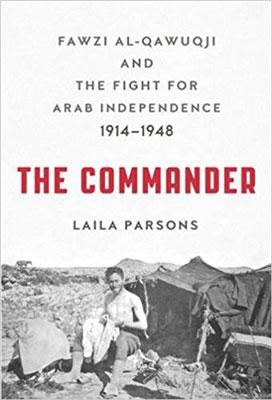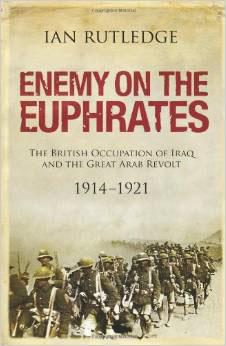You are here
Committed to fighting for Palestine
By Sally Bland - Jan 21,2018 - Last updated at Jan 21,2018

The Commander: Fawzi Al-Qawuqji and the Fight for Arab Independence 1914-1948
Laila Parsons
London: Saqi Books, 2017
Pp. 295
Combining history with biography to trace the career of Fawzi Al Qawuqji, historian Laila Parsons provides a close-up view from a new angle of the seminal events of the first half of the 20th century that shaped the Middle East and whose echoes are still being felt today.
Born in Tripoli, in today’s Lebanon, in 1894, Qawuqji was trained as an officer in the War College of Istanbul. He fought with the Ottoman army in World War I until the very end, including against the British army’s advance in Palestine. Later, he participated in the major anti-colonial struggles that followed the colonial division of the area. “The Syrian Revolt of 1925-1927 [against the French] marked Qawuqji’s transition from pursuing a settled professional career as a cavalry officer in a state army to leading a peripatetic life of rebellion and exile.” (p. 40)
Qawuqji was instrumental in organising and commanding local forces in the 1936 revolt in Palestine, and the 1941 rebellion in Iraq, both directed against the British colonial army. “Before Qawuqji’s arrival, rebel attacks in Palestine had been single strikes, done quickly and at night. What Qawuqji brought to the revolt was his expertise in longer-term strategies that he had learned as an officer in the Ottoman Army.” (p. 128)
These exploits led to his being appointed field commander of the Arab Liberation Army in the 1948 Palestine War.
Added to the drama of this tumultuous period, “The Commander” is particularly fascinating reading for two reasons. Firstly, Qawuqji is a controversial figure, and Parsons engages head-on with the various images of him that have persisted over the years. Secondly, Parsons makes the reader privy to her deliberations as a historian. One gets an idea both of how history is made and how it is written.
Qawuqji was indisputably a charismatic figure, able to inspire confidence and loyalty in diverse social groups, from tribes and peasants to urbanites. Many regarded him as a hero. “Unlike the many leading Arab nationalists, who came from elite landowning families, Qawuqji always possessed the ability to connect directly with common people, whom the elites claimed to speak in the name of but who in fact often represented a threat to their social and economic status.” (p. 190)
Serious accusations were leveled at him, such as collaborating with the British, many stemming from his conflict with Hajj Amin Al Husayni, mufti of Jerusalem. “Qawuqji’s relationship with the mufti, forged in the mid-1930s during the preparations for revolt in Palestine, came to dominate Qawuqji’s career.” (p. 112)
One source of their differences lay in their outlook: Qawuqji was representative of those who saw Palestine as a pan-Arab struggle where victory might result in a Greater Syria, whereas after the failure of Faysal’s state in Syria, the mufti had worked to develop a Palestinian national movement independent of Syria nationalism.
In dealing with the accusations levelled by the mufti and others, Parsons gives the reader insight into a good historian’s craft. While Qawuqji’s memoirs and personal archive in Beirut were main sources for the book, she also consulted the memoirs of soldiers and politicians who lived the same events, and carried out extensive archival research in Damascus, Britain, France, Germany and Jerusalem. Sifting through the evidence, she gives multiple perspectives on disputed facts before advancing her own conclusions. Though listing Qawuqji’s mistakes, she characterises him as “a transnational fighter… genuinely committed to fighting for Palestine”. (p. 250)
Like other Arab nationalists in exile, Qawuqji spent part of World War II in Berlin. Some historians accuse them of collaboration with the Nazis, but Parsons sets the record straight, relying on German historian Gerhard Hopp whose study shows that Qawuqji’s “interest in German power in this period came from his desire to rid the Middle East of the British and the French, not from anti-Semitism or some commitment to Nazi ideology”. (p. 169)
Though focusing on a leader, Parson’s account has elements of “history from below”, reminding that the outcomes of rebellions and war are not only decided by bravery or fighting ability, but by the quality of equipment, viable supply lines and the ability to pay soldiers’ salaries.
A passage on the 1936 revolt is revealing, especially as it is known that support promised from the outside was not always forthcoming: “More complicated by far was the impact that Qawuqji’s arrival had on those villagers he called upon to supply fighters, food, and water. For some of the young men of the villages it was an exciting opportunity to fight… Many families, however, felt the burden of having to give up precious food stocks…” (p. 125)
The humanitarian crisis for Palestinians was far worse in 1948, and post-defeat recriminations much harsher. Parsons estimates that the only way Qawuqji could have avoided criticism was not to accept command of the Arab Liberation Army in the first place. Yet, a quote from his memoirs may explain his acceptance of that impossible task: “I am a hostage to Arab events and interests, and when the struggle calls me to whichever area I am needed, I am ready to follow that call.” (p. 183)
Related Articles
Mapping My Return: A Palestinian MemoirSalman Abu SittaCairo/New York: The American University in Cairo Press, 2016Pp.
Much of “Enemy on the Euphrates” reads like a great adventure story, proving how fascinating real history can be
Memories: An Oasis in TimeKamel S. Abu JaberUK: Hesperus Press Limited, 2023Pp.


















